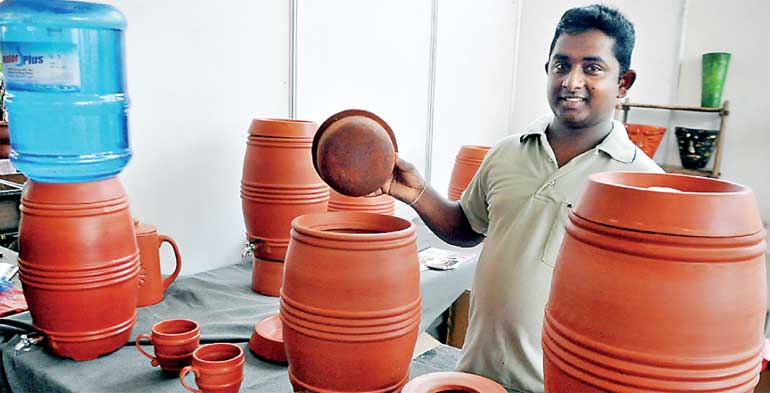Sunday Feb 22, 2026
Sunday Feb 22, 2026
Tuesday, 17 November 2015 01:31 - - {{hitsCtrl.values.hits}}
In his economic policy statement to Parliament recently, Prime Minister Ranil Wickremesinghe set out ambitious goals for improving Sri Lankans’ lives: one million new jobs, higher incomes, more trade and investment, and reducing inequality to build a wider middle class.
Small and medium-scale businesses featured prominently in the Government’s new blueprint for the economy. “Local entrepreneurs must now enter the global markets,” the Prime Minister said, vowing to smooth obstacles in their path. “We will help them enhance their productivity levels and develop competitiveness.”

SMEs matter so much because they account for around 70% of national employment around the world
The focus on Small and Medium-sized Enterprises (SMEs) and their competitiveness in international markets is appropriate. New research from the International Trade Centre (ITC), the joint agency of the United Nations and the World Trade Organization, confirms that successful SMEs are critical drivers of inclusive growth.
ITC’s SME Competitiveness Outlook, released last month, spells out how developing countries can understand what is holding small and mid-sized firms back, and how best to enable them to succeed in international markets.
SMEs matter so much because they account for around 70% of national employment around the world. And jobs are the main channel through which people share in – or are left out of – economic growth.
Small companies everywhere tend to be less productive than large ones. But the gap between small and large businesses is far wider in developing countries. Low productivity means meagre wages and worse working conditions. Closing this gap by improving SME productivity translates into more and better paying jobs, distributed across a large cross-section of the economy.
Emphasis on trade
The economic policy statement’s emphasis on trade is justified. Evidence shows that when SMEs are able to ‘internationalise’, whether by exporting or importing directly or selling to firms that do, they register particularly high productivity, wage, and employment gains. Encouraging Sri Lankan entrepreneurs to reach out to markets in Asia and beyond makes a lot of sense.
But while we know that helping SMEs become more productive and competitive contributes to inclusive growth, figuring out how best to do so isn’t easy. The factors holding SMEs back vary from one place to another. In some places, access to finance dries up the moment businesses become too big for micro-lenders. Elsewhere, tax policies penalise firms for growing. Intermittent electricity often renders them uncompetitive. Sometimes firms themselves lack skilled managers and staff. They might struggle to meet international health and safety standards.
The SME Competitiveness Outlook helps us understand the country-specific constraints most relevant to business success. The report systematically organises them across three key pillars: the ability of SMEs to connect, compete and change. It then analyses these determinants of SME competitiveness at the level of companies, their immediate business environment, and national policy.
Problems on any pillar, at any level, can be fatal to international competitiveness. For instance, the ability of a country’s SME sector to supply quality goods in a timely and cost-effective manner depends on firms’ own abilities. But it also relies on the existence of systems to certify that their products meet international standards, as well as macro-level considerations like swift customs procedures.
The report’s findings will help governments and their partners identify which weaknesses are most harmful, paving the way for targeting reforms where they are most needed. Why invest more in expensive broadband infrastructure when what companies really need are bank accounts?
Sri Lanka’s performance
Among the lessons to emerge from the inaugural report is that across developing country regions, smaller firms vastly underperform larger ones in terms of using the internet to connect to customers and suppliers. Sri Lanka, one of 25 developing countries analysed in detail in the report, is no exception. Small firms’ weak use of email and websites is responsible for the country’s poor performance  under the ‘connectivity’ pillar of competitiveness. Mid-sized firms do only modestly better.
under the ‘connectivity’ pillar of competitiveness. Mid-sized firms do only modestly better.
Sri Lanka’s performance was characterised by a striking divide between the capabilities of small and large firms. Sri Lankan companies with more than 100 employees outperformed across the board, from securing international quality certification to licensing foreign technology and offering formal training to staff. Meanwhile, companies with fewer than 19 employees fell consistently short of their counterparts in countries at comparable levels of development. An exception was the share of business investments financed by banks, where firms of all sizes scored well, though many still felt access to finance to be a constraint on growth. The ability to secure financing is a critical determinant of businesses’ capacity to adapt and innovate in the face of changing market conditions.
"Evidence shows that when SMEs are able to ‘internationalise’, whether by exporting or importing directly or selling to firms that do, they register particularly high productivity, wage, and employment gains. Encouraging Sri Lankan entrepreneurs to reach out to markets in Asia and beyond makes a lot of sense"
Sri Lankan companies operate in immediate and national business environments that are, for the most part, somewhat better than those in countries with similar incomes. Vis-à-vis its peers, the island registers particularly well on the quality of the government’s online services, and the time needed to navigate regulations – though business licensing requirements weigh on companies of all sizes. The country did less well on reliable access to electricity and the internet.
Moving forward
As the Government moves forward on its new economic policy, it would do well to complement its emphasis on building digital infrastructure and skills with work to enhance smaller companies’ internet savvy. Small firms would also benefit from support to obtain the product quality certifications that have become essential to integrating into international value chains.
Enabling SMEs and future start-ups to increase their competitiveness and connect to international trade and investment would go a long way towards achieving Prime Minister Wickremesinghe’s goals of building an open, dynamic economy that yields results for all.
Sri Lankan SMEs will get a chance to discuss their policy priorities, and meet potential international buyers, next year in Colombo, when the Sri Lanka Export Development Board and ITC team up to host the World Export Development Forum. Previous editions of ITC’s annual flagship event have been marked by cutting-edge policy dialogue on SME issues – and millions of dollars’ worth of business-to-business deals. ITC looks forward to working with Sri Lanka on its development journey.
(Arancha González is the Executive Director of the International Trade Centre.)